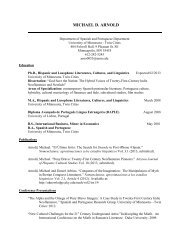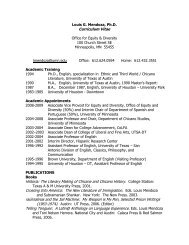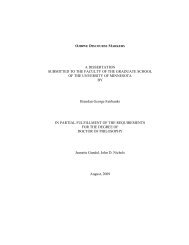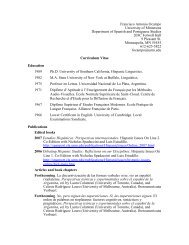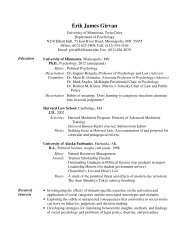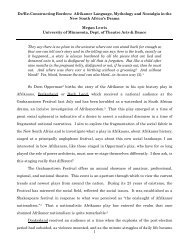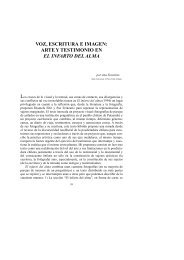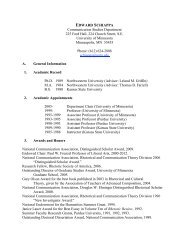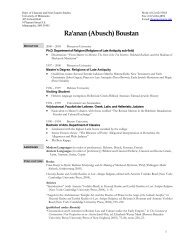Source Cues, Partisan Identities, and Political Value Expression
Source Cues, Partisan Identities, and Political Value Expression
Source Cues, Partisan Identities, and Political Value Expression
You also want an ePaper? Increase the reach of your titles
YUMPU automatically turns print PDFs into web optimized ePapers that Google loves.
CUES, PARTY, AND VALUES 813<br />
The critical question is whether Republicans respond<br />
more forcefully than Democrats when cued that<br />
“Democrats believe” in equal opportunity <strong>and</strong> moral tolerance,<br />
<strong>and</strong> whether Democrats respond more vigorously<br />
than GOP partisans when hearing that “Republicans believe”<br />
in self-reliance <strong>and</strong> moral traditionalism. 12 If negativity<br />
bias is present, then the absolute value of the decrease<br />
in expressed value support for partisans getting<br />
the out-party cue should exceed the increase among the<br />
cue giver’s fellow partisans. 13 We explore these patterns<br />
for partisans in general (i.e., strong, weak, <strong>and</strong> leaning<br />
identifiers on the 7-point self-categorization scale) <strong>and</strong><br />
extreme partisans (i.e., strong identifiers on the 7-point<br />
scale).<br />
Table 4 presents the predicted mean level of expressed<br />
support for each value (on a 0.00–1.00 scale) among identifiers<br />
in the control <strong>and</strong> party-cue groups. We begin with<br />
equal opportunity. For Democrats the equal opportunity<br />
mean is .89 in the uncued group <strong>and</strong> .93 in the cued group,<br />
indicating that the Democratic source cue enhances expressed<br />
support among Democratic partisans (p < .10).<br />
As predicted, the source cue proves more consequential<br />
among Republicans as their expressed support for equality<br />
declines from .73 in the control group to .63 in the<br />
treatment group (p < .05). 14 The same pattern holds<br />
for strong partisans. When strong Democrats hear that<br />
Democrats believe in equal opportunity, their expressed<br />
support rises from .96 in the uncued group to 1.02 in<br />
the cued group (p < .10). When strong Republicans receive<br />
what is for them a negatively valenced cue, expressed<br />
support for equal opportunity falls from .70 to .60 (p <<br />
.05). In short, the Democratic source cue produces a bigger<br />
net change in value endorsement among Republicans<br />
than among Democrats.<br />
12 Recall that negativity bias will be present when the perceptual<br />
background is evaluated positively <strong>and</strong> is accompanied by a negatively<br />
valenced cue. We assume that in-party/out-party cues are<br />
positively/negatively valenced for those partisans. Moreover, our<br />
analysis shows that the mean level of support for each value is<br />
positively valenced (i.e., value mean ≥ .50) for Democratic <strong>and</strong><br />
Republican identifiers (leaners counted as partisans) in the control<br />
condition in 13 of the 16 group comparisons we make in Tables 4–5.<br />
The exceptions are strong Republicans, conservative Republicans,<br />
<strong>and</strong> strong conservative Republicans on moral tolerance.<br />
13 Our experimental design only allows us to test whether differences<br />
in cue valence across partisan categories influence expressed<br />
value support (e.g., the impact a Democratic endorsement has on<br />
Democratic <strong>and</strong> Republican value positions). We cannot explore<br />
whether differences in cue valence within partisan categories produces<br />
asymmetrical responses (e.g., the impact Democratic <strong>and</strong><br />
Republican sanctions have on Democratic value positions). Once<br />
again, ours is not a complete test of the negativity bias hypothesis.<br />
14 All results remain very similar in form, magnitude, <strong>and</strong> significance<br />
when controls for age, income, gender, education, <strong>and</strong> race<br />
are included.<br />
Does the same pattern obtain when Republican<br />
sources endorse self-reliance? When Democrats receive<br />
this message, expressed support declines from .72 in<br />
the control group to .63 in the treatment group (p <<br />
.01). The decline is even more pronounced among strong<br />
Democrats as the Republican cue yields a .77 to .61 decline<br />
(p < .01). In contrast, the Republican endorsement<br />
does not systematically affect positions taken by Republican<br />
identifiers. The cue leads to a decline in expressed<br />
support among Republicans (p < .05); however, this<br />
counterintuitive effect vanishes among strong partisans<br />
(.91 vs. .90, ns). More broadly, the self-reliance experiment<br />
demonstrates that out-party cues have more potent<br />
effects on identifiers’ expressed values than in-party<br />
cues.<br />
The results for the moral traditionalism experiments<br />
appear in the third panel of Table 4. Here we find more<br />
limited evidence that party cues motivate changes in expressed<br />
value support among opposition partisans. To<br />
elaborate, Republican endorsement of family values has<br />
no effect in the larger partisan groups. Cued Democrats<br />
are no less willing to endorse family values than uncued<br />
Democrats (.61 vs. .62, ns); the same holds true for GOP<br />
identifiers (.86 vs. .84, ns). When attention turns to strong<br />
partisans, Republican endorsement of traditional morality<br />
drives expressed Democratic support down from .68 to<br />
.59 (p < .10) <strong>and</strong> has no effect on the views of ardent Republicans<br />
(.98 vs. .96, ns). In short, negativity bias seems<br />
to emerge only among strong partisans.<br />
Moral tolerance is the final value under consideration.<br />
These experiments do not support our expectations.<br />
First, the Democratic source cue does not appear to<br />
influence expressed value support among Democrats or<br />
Republicans. Second, among strong identifiers the source<br />
cue effect is again limited to one side of the spectrum,<br />
in this case increasing expressed support among those on<br />
the left. When strong Democrats are told their copartisans<br />
believe in tolerating those with diverse moral viewpoints,<br />
tolerance scores rise from .68 to .78 (p < .05). Strong<br />
Republicans, in contrast, prove unresponsive, with those<br />
in the cued group as cool toward tolerance as those in the<br />
uncued group (.45 vs. .43, ns).<br />
To summarize the results so far, out-party cues produce<br />
larger effects on expressed value support among partisans<br />
in general on two of four values (equal opportunity<br />
<strong>and</strong> self-reliance) <strong>and</strong> among strong partisans on three of<br />
four values (equal opportunity, self-reliance, <strong>and</strong> moral<br />
traditionalism). So far, then, the negativity bias hypothesisreceivesrealifnotoverwhelmingsupport.However,as<br />
we shall see shortly, evidence on its behalf is even stronger<br />
when analysis is confined to ideologically congruent<br />
partisans.



